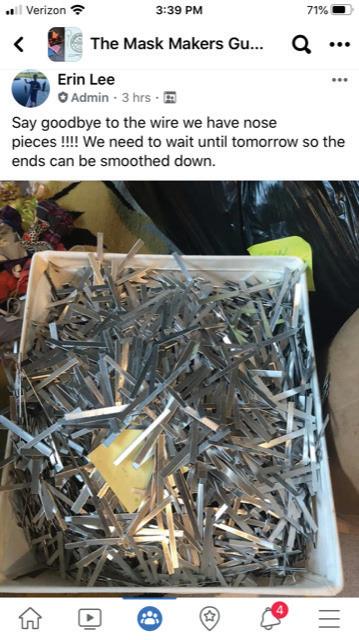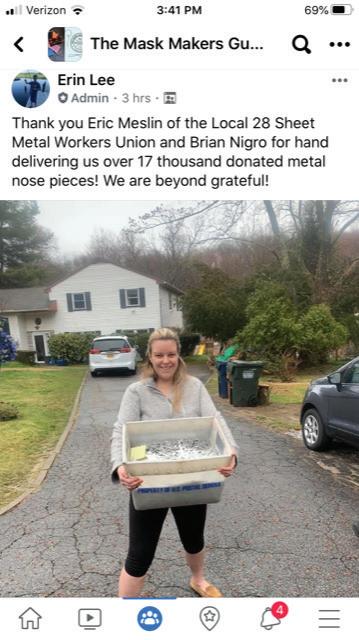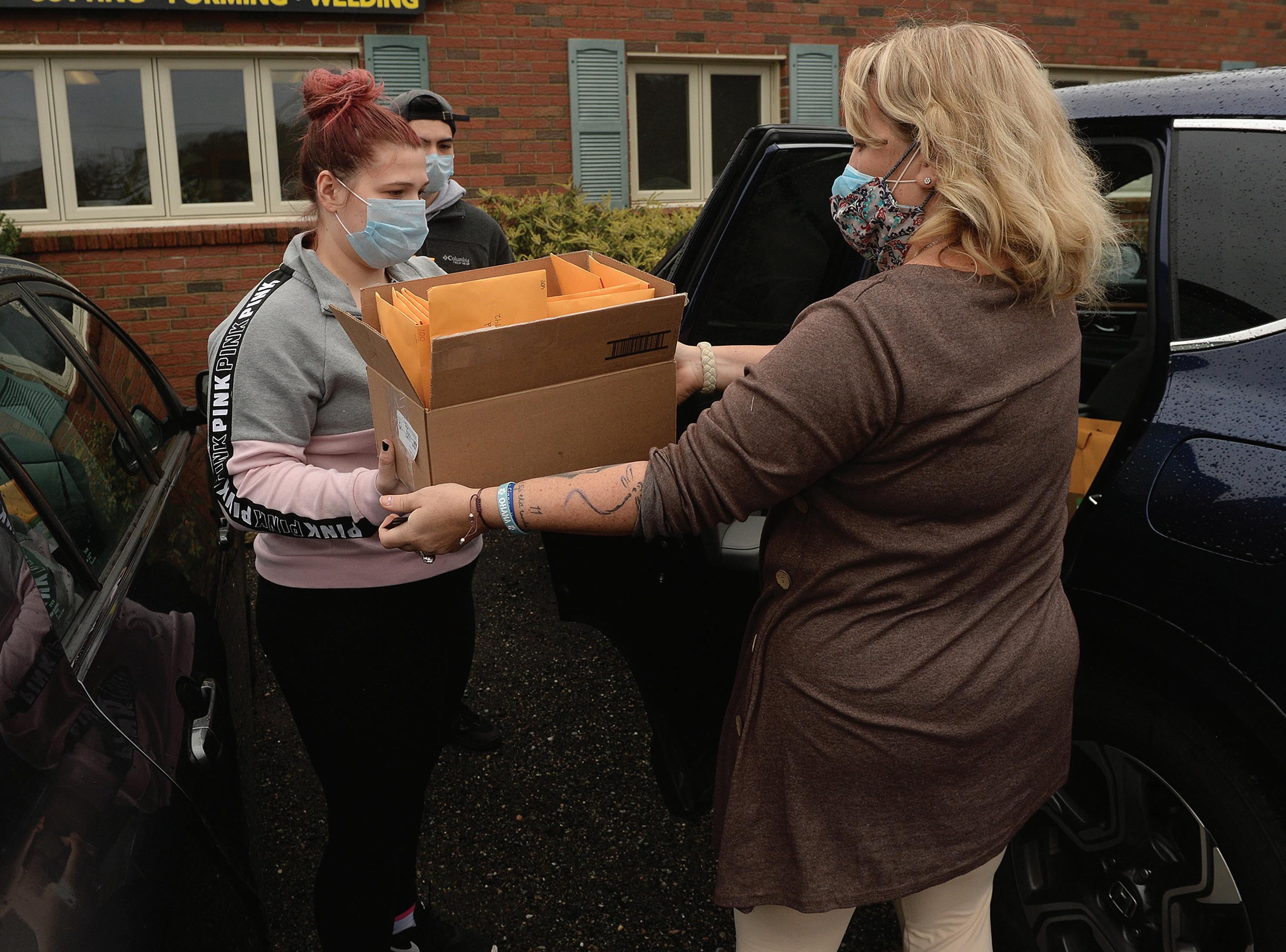
6 minute read
SMALL IDEA, HUGE INSPIRATION
From one small shop in Connecticut to a national cause, metal nose strips bring people together
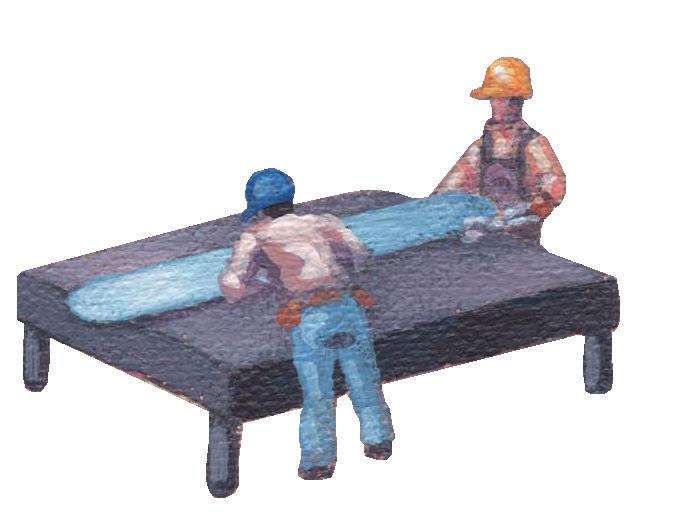
By / Natalie Bruckner Photo courtesy of The Day
There’s an old adage that goes, “mighty oaks from little acorns grow.” When Joe de la Cruz, vice president of the Hillery Company and Local 40 member, cut his first metal nose strips in his custom fabrication shop in Groton, Connecticut, little did he know the ripple effect it would have.
“It started as an idea,” he says. “A local nurse from Lawrence + Memorial Hospital asked my wife if I would be able to make 25 aluminum nose strips, like those used on N95 masks, for the masks being made by the volunteers.”
The aluminum nose strips are critical to custom-fitting the top of the mask to a person’s face to increase the efficacy of the mask at repeling droplets that could potentially contain or spread illness.
The next day, de la Cruz bought two aluminum sheets— enough for 200 nose strips—and decided to post online to see if anyone needed any.
“In less than a week, we had around 3,000 requests from people all across the country,” de la Cruz says. “We were overwhelmed. I mean, we are sheet metal workers, and were not really sure what to do with this.”
He reached out to Local 40 in Rocky Hill, Connecticut, to explain the situation and see if they could assist. “When Joe contacted me, my only thought was, ‘Let’s get going,’” says David Roche, business manager at Local 40. “As soon as we heard they were getting inundated, we got sheets of metal and started chopping them up.”
As word spread, so did the number of requests, so Roche contacted Paul Pimentel, communications and research at SMART, and asked him to put the message out to the SMART Army. “Paul arranged a conference call, and we all said, ‘Let’s do this,’” Roche says. “It was that easy. In my 17 years as a
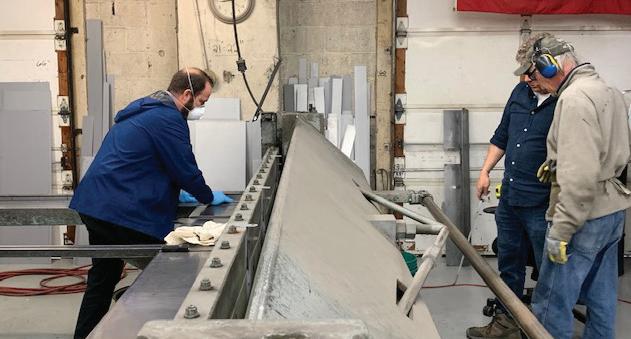
business manager, I’ve never had such a satisfying feeling as I have now, being part of this movement.”
Pimentel created an online request form and began publicizing it on social media on April 7. Within hours, the union had over 100 requests. For efficiency, when each request comes in SMART assigns it to a Local near that zip code. The Local then works with a union contractor in the area to produce the strips and deliver them to the volunteer or organization.
As of May 1, the SMART Army has donated thousands of hours and metal nose strips, and, according to Pimentel, has filled more than 19,000 requests totaling more than 12 million nose strips. The only challenge now is a shortage of material to create the thin and flexible pieces.
“It has been a rollercoaster,” de la Cruz says. “I have people phoning me up daily in tears. I had one lady from Washington state telling me she needed 1,000, so we reached out to our partners and she got the pieces in the afternoon from a local contractor. It’s a repeating story.”
At his own shop, de la Cruz and his team have cut 55,000 metal nose strip so far and shipped 500,000 pieces, despite being on a skeleton crew while adhering to social distancing practices. He says that for Connecticut, the big saviour for him and his team was United Contracting & Roofing in Local 38, which physically delivered 200,000 pieces to de la Cruz to ship.
In addition to making the strips and filling requests, de la Cruz has been sharing the specifications for the strips with other shops—three-inch-long by 1/4-inch-wide strips that are cut using a shear. “We’re not reinventing the wheel here,” he says.
De la Cruz adds that being part of a cause that is causing such a big impact makes him very emotional. “Everywhere I look, I see them,” he says. “My wife often says to me, ‘Are you
“In my 17 years as a business manager, I’ve never had such a satisfying feeling as I have now, being part of this movement.” —Dave Roche, business manager, Local 40
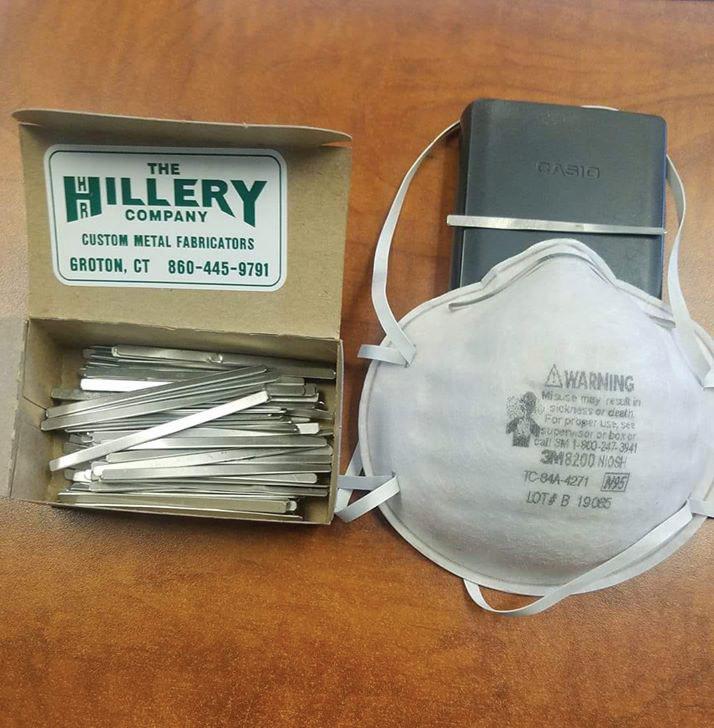
going to cry?’ What makes me so emotional is that the union jumped right in, and we have brothers and sisters all stepping up to support communities and each other—we are part of something bigger than ourselves. It has been life-changing for my family. My wife joins me at work every day to help take orders and handle shipping.”
Scour the internet and social media feeds for SMART or SMACNA pages and type in #MillionMaskChallenge or #Smartarmy and you will be overwhelmed by the sheer number of labor and management organizations working together to ensure those who need the metal nose strips get them as quickly as possible, a case of #givingback at its finest.
“We want to do everything we can to help and support health care workers and first responders who are on the front lines helping people and savings lives in our communities during this public health crisis,” says SMART General President Joseph Sellers. “This is a great idea that began with one union shop in Connecticut and took off like wildfire. We are now working to scale this up as fast as we can across the United States and Canada.”
Jim Paquette, business manager at Local 280 in Vancouver, British Columbia, says SMACNA contractors Smith Sheet Metal and Viaduct Sheet Metal and the Sheet Metal Workers Training Centre (SMWTC) have also come together to contribute to the relief effort by donating time and materials in the production of metal nose strips.
As of May 1, theses organizations combined have cut approximately 18,000 aluminum strips for nose pieces. The material has been donated, either by the employer or by the metal supplier for the SMWTC, as have the time and labor to shear them all up.
Local 280 has been picking up, packaging, and mailing orders ranging in size from 40 to 1,000 across the province. “They are going to various volunteers who are busy sewing face masks, and the orders keep coming in,” says Paquette.
Over at Local 40, they have made more than 30,000 metal nose strips to date and are sending out approximately 6,000 a day. Roche and five members of his team get into the office at about 6:30 a.m. and start working on the orders. He adds that when people phone up to thank them, he says, “You don’t need to thank us or donate. It’s what we do.”
Afterall, sheet metal workers are known for supporting families in time of need, and that doesn’t always mean family by blood. “I tell people, this is why the wizard gave the tin man a heart,” Roche says. “Because he knew how to put it to good use.” ▪
Natalie is an award-winning writer who has worked in the United Kingdom, Germany, Spain, the United States, and Canada. She has more than 23 years experience as a journalist, editor, and brand builder, specializing in construction and transportation.
